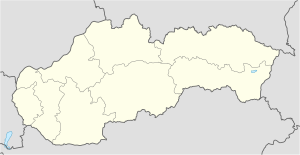Slovakia has five operational nuclear reactors, with a combined net power capacity of 2,308 MWe, with a sixth coming on line shortly.[citation needed][when?] Within the EU, Slovakia is one of the pro-nuclear Visegrád Group nations.[1]
In 2018, nuclear power produced approximately 55% of the country’s electricity.[2] With the additional two reactors starting in 2023, Slovakia is now in a position to be a net exporter of nuclear electricity.[3] The country has two sites for its atomic projects: Bohunice Nuclear Power Plant (BNPP) and Mochovce Nuclear Power Plant (MNPP).
Reactors
editTwo V-213 reactors, designed by Atomenergoproekt and built by Skoda at the Bohunice V2 plant. The V2 units construction began in 1976 and commenced operation in 1984 and 1985 and each provide 466 MWe.[4]
In 1982 construction on two units of the planned four-unit Mochovce nuclear power plant was commenced by Skoda, using VVER-440 V-213 reactor units, they were commissioned between 1998 and 1999. Originally 405 MWe, they were upgraded in 2008 to 438 MWe.[4]
The government of Slovakia has been committed to nuclear power, and two new reactors began construction at MNPP in 1987,[2] but were suspended in 1992. The project reactivated in 2009.
The two new reactors at Mochovce have a net electrical capacity of 440 MW each.[2] Enel, an Italian power company and 50% shareholder of Slovenske Elektrarne, initially planned an investment of €1.6 billion for the completion of the MNPP units 3 and 4 by 2011–2012. In January 2006 the Slovak government approved a new energy strategy incorporating these plans, with capacity uprates at MNPP units 1 and 2, and at BNPP units 3 and 4.[5]
Mochovce-3 came on-line in January 2023.[4] Mochovce-4 is due to follow within a year.
In August 2023 Slovakia signed an agreement to receive nuclear fuel from the American company Westinghouse as a step towards moving away from Russian source fuels.[6] Slovakia is also talking to France's Framatome to work together on the development of a nuclear fuel for VVER-440 pressurised water reactors.
Future development
editA proposal was put forward in February 2023 for permission to build unit 5 at Bohunice.[4] The new reactor has an expected output of 1,200 megawatts. The utility Slovenske Elektrarne is the commissioner.[7]
In July 2023 an agreement with Westinghouse was signed on the potential deployment of its AP1000 and AP300 small modular reactors in Slovakia.[4]
Reactors deactivated and decommissioned
editThree reactors have been deactivated.
- 110 MWe Russian-designed Bohunice A1 reactor, built by Skoda, completed in 1972 and ran until 1977 when it was closed due an accident arising from refuelling.[4]
- Two VVER-440 V-230 reactors at the Bohunice V1 plant, supplied by Atomenergoexport of Russia and Skoda, completed in 1978 and 1980, closed in 2006 and 2008.[4]
Prior to its accession to the European Union, Slovakia had to shut down two of its older reactors at Bohunice, because they did not meet European safety standards.[8] Although Slovakia spent significant effort to achieve WANO standards, the EU insisted on the shutdowns.[9] The first plant closed 31 December 2006 and the second on 31 December 2008. The closure of these units, prior to the completion of two new reactors has left the country short on power and Slovakia became an energy importer after the first plant was shut down.[1][10]
At Bohunice, two reactors of the V1 plant have been deactivated. The total cost of decommission and dismantling of Bohunice V1 by 2025 is estimated at €1.14 billion.[11]
The first reactor pressure vessel was removed from Bohunice V1 on June 3, 2020.[12] It is the first decommissioning of a VVER 440 plant to be completed.[13] The process was completed amid health and safety regulations in place to prevent the spread of the coronavirus.[13]
Waste disposal
editRadioactive waste in Slovakia is disposed without reprocessing. The spent fuel stays at the reactor site; however, some spent fuel has been exported to Russia. Slovakia has also begun a search for a high-level waste repository and established a fund with approximately €775 million to build it.[citation needed]
See also
editReferences
edit- ^ a b "Visegrad group backs nuclear energy". China.org.cn.
- ^ a b c "Slovak Republic". Power Reactor Information System (PRIS). IAEA. 12 January 2020. Retrieved 13 January 2020.
- ^ "Mochovce 3 output increased to 55%". 31 March 2023.
- ^ a b c d e f g "Nuclear Power in Slovakia". August 2023.
- ^ "Nuclear Power in Slovakia". World Nuclear Association. August 2008. Retrieved 20 August 2008.
- ^ "Slovakia refuses to supply nuclear fuel from Russia". 29 August 2023.
- ^ "Slovakia plans to build a new nuclear reactor".
- ^ "Decommissioning of nuclear facilities". ec.europa.eu. European Commission. 31 July 2014. Retrieved 13 January 2020.
- ^ "Slovakia Sets Global Example for Nuclear Power Plant Decommissioning". April 2023.
- ^ "Visegrad Group Nuclear Power Newswire - Nuclear Power News Today - EIN Presswire".
- ^ "Nuclear Decommissioning: Decommission nuclear facilities - World Nuclear Association". World Nuclear Association. May 2020. Retrieved 5 June 2020.
- ^ "First RPV removed in Bohunice V1 decommissioning : Waste & Recycling - World Nuclear News". World Nuclear News. 3 June 2020. Retrieved 5 June 2020.
- ^ a b "Decommissioning milestone at Slovakia's Bohunice VI - Nuclear Engineering International". Nuclear Engineering International. 4 June 2020. Retrieved 5 June 2020.
